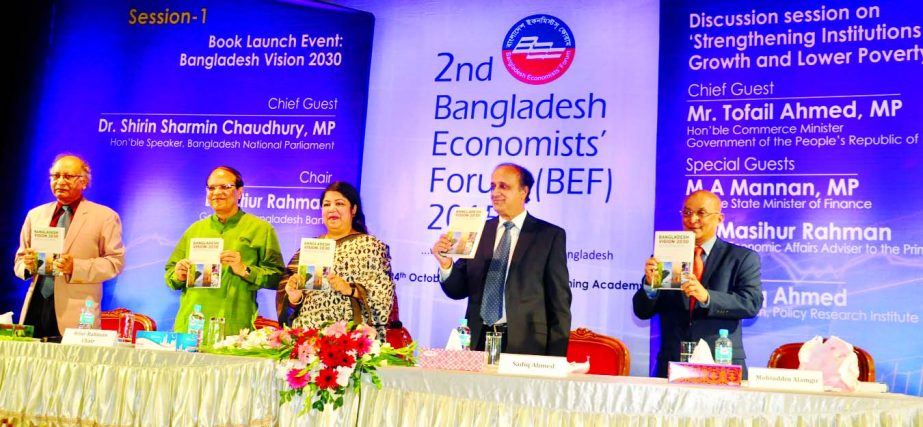
Country’s renowned economists have underscored the need for strengthening institutions with a view to accelerating growth and reducing poverty from the society.
Today the weakening of the civil service is a fundamental reason for the weakness in public administration. Lack of motivation, supervision, leadership and accountability is the reason behind the weak public administration, they claimed.
They alleged inadequacy of the civil service is a major institutional failure. Moreover, politicization of the bureaucracy has eroded the mutual trust of contending political entities in the objectivity in decision making and even in the conduct of national election.
The conference was told that the law and order is an important element for ensuring peace, stability, growth and poverty reduction in the country. Institutions of law must be seen as a source of comfort and should not pose a threat to life and property of citizens. However, they said Bangladesh scores poor in the rule of law index.
The economists were addressing the inaugural ceremony of the second Bangladesh Economic Forum Conference (BEF-2015) and launching a book styled “Bangladesh Vision 2030” in the auditorium of Bangladesh Bank Training Academy (BBTA) in the city.
Speaker of the National Parliament Dr. Shirin Sharmin Chowdhury, attended the inaugural function as the chief guest while Bangladesh Bank Governor Dr Atiur Rahman was in the chair.
The leading economists — Dr. Wahiduddin Mahmud, Dr. Sadiq Ahmed, Dr. Mohiuddin Alamgir and Dr. Mustafa Kamal Mujeri – spoke on ‘Strengthening Institutions to Accelerate Growth and Lower Poverty'” in which they addressed some major problems of the country to attain a vibrant economy.
Addressing the conference, Dr. Wahiduddin Mahmud said that the budgetary allocation in human development fund is lower compared to other least developed countries (LDCs). He urged the government to turn attention in this regard. He also emphasized on improving education system of the country to create skilled manpower.
Dr. Mohiuddin Alamgir said the structure and working pattern of bureaucracy are a legacy of the British colonial rule. Civil-military elitism has reduced accountability of the administration, resulting in a dominating bureaucratic structure with corruption.
“It is passing buck to the past and accepting no responsibility for the weakness of today”, he said, adding: The Public Administration Reform Commission (PARC) could not be implemented due to bureaucratic resistance and politics.
“Bangladesh continues to rank low in the control of corruption. In the context of country’s corruption, is not just about catching a corrupt person or institution but mere about letting the development process, he said.
He underscored the need for providing necessary resources, personnel, technology and political and administrative support for making the Anti Corruption Commission (ACC) effective.
“ACC is less of a crime control unit but more a developmental institution monitoring transparency and accountability in all development activities as well as all spheres of public life. Bureaucrats, service providers, law and order personnel, the judiciary and the elected representatives all come under rudder of the ACC. Local government function and effectiveness have been handicapped. All governments have talked about decentralization of power which has not happened in effect,” he said.
Actually, democracy thrives on independence of three organs — the executive, the legislative and the judiciary –, but preserving the independence of the judiciary is a challenge. A major problem of the judiciary in Bangladesh is the backlog of cases. The quality of personnel is also an issue.
“It is true that courts have given judgment against the government, but the perception is that in sensitive and political cases the governments will prevail,” he claimed. Now, it is a common phenomenon that courts have been used to harass opposition politicians by the influence of the government, he further claimed.
He alleged that the law enforcement agencies have blurred due to over enthusiasm, political patronage and criminal intent. He stressed the need for increasing effectiveness of the law enforcement agencies. “We need a peaceful environment where a small entrepreneur as well as a large investor will feel sufficiently secure and encouraged to take his investment risks.”
Political institutions are critical to ensure political stability, he said, adding: Over the past decade, the effectiveness of the parliament as a decision-making body has been hampered by the absence of a strong opposition party. Bangladesh needs to institutionalize democracy in order to accelerate growth and poverty reduction.
He stressed on a vibrant civil society with a view to strengthening democracy and mitigating political violence. He also underscored the need for improving the infrastructure of the country to attract foreigmn direct investment (FDI). “Effective utilization of FDI is important to accelerate the economic growth,” he said.
Dr. Alamgir urged the government to take immediate steps to solve the energy crisis in the country to ensure investment. He also put emphasized on better governance, trade liberalization and regional connectivity for enhancing trade and business.
Speaking on the occasion, Mustafa Kamal Mujeri underscored the need for improving the efficiency of the government to accelerate growth of economy. Accountability of the institutions and access to finance for the underprivileged people are very crucial for the development process, he observed.
Talking about Annual Development Budget (ADB) implementation, he said it did not reach the satisfactory level. He urged the government to form an independent autonomous cell under Prime Minister’s Office in order to implement the mega projects effectively across the country.
Revenue collection is contributing only 12 per cent in country’s GDP where it is 18 per cent in the neighbouring Nepal. He suggested for strengthening the capacity building of the National Board of Revenue (NBR) to collect more revenue for the betterment of economy.
Financial stability in the banking sector, especially in the state-owned commercial bank’s (SCBs), is also important. He demanded to strengthen the monitoring and governance of the SCBs to check the non-performing loans.

